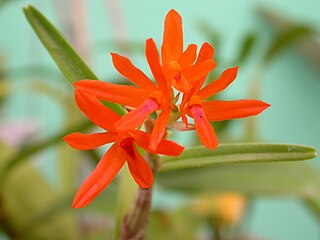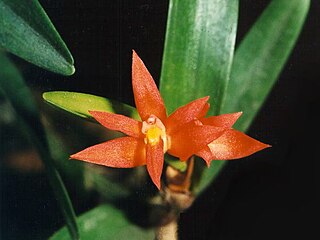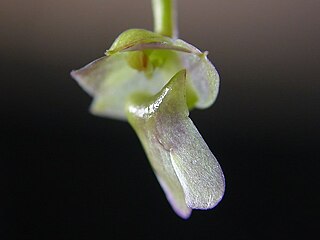
Inia is a genus of river dolphins from South America containing one to four species.

Squirrel monkeys are New World monkeys of the genus Saimiri. Saimiri is the only genus in the subfamily Saimirinae. The name of the genus is of Tupi origin and was also used as an English name by early researchers.

Isochilus is a genus of orchids with 13 recognized species. They are lowland epiphytes mainly found in Central America, from Cuba and Mexico to Argentina.

The black-capped squirrel monkey is a species of New-World monkey native to the upper Amazon basin in Bolivia, western Brazil and eastern Peru. They weigh between 365 and 1,135 g and measure, from the head to the base of the tail, between 225 and 370 mm. Black-capped squirrel monkeys are primarily tree-dwelling and are found in both native and plantation forests as well as some farmed areas near running water. Their diet is omnivorous and mostly consists of flowers, fruit, leaves, nuts, seeds, insects, arachnids, eggs and small vertebrates. They mostly live in female-dominated troops of around 40 to 75 monkeys, with males having been observed to disperse to live in all-male troops after reaching sexual maturation. Their current conservation status according to the IUCN is 'Least Concern'. The species belongs to the genus Saimiri and has two subspecies, S. b. boliviensis and S. b. peruviensis.
The Bolivian bamboo rat, is a species of spiny rat from South America.

Akodon spegazzinii, also known as Spegazzini's akodont or Spegazzini's grass mouse, is a rodent in the genus Akodon found in northwestern Argentina. It occurs in grassland and forest at 400 to 3,500 m above sea level. After the species was first named in 1897, several other names were given to various populations now included in A. spegazzinii. They are now all recognized as part of a single, widespread and variable species. Akodon spegazzinii is related to Akodon boliviensis and other members of the A. boliviensis species group. It reproduces year-round. Because it is widely distributed and common, Akodon spegazzinii is listed as "least concern" on the IUCN Red List.
The Bolivian tuco-tuco is a species of rodent in the family Ctenomyidae. It is found in Brazil, Paraguay, Argentina, and Bolivia.

Scaphyglottis is a genus of orchids native to Mexico, Central America, northern South America and parts of the Caribbean. The current concept of this genus is the result of combining several genera which have been described at various times. The concept is characterized by the growth habit: not only are new pseudobulbs added at the base of the old ones, but new pseudobulbs also grow at the apices of the old ones. Many species are quite similar and difficult to distinguish, but some are clearly distinct. A few have showy colors. The genus comprises nearly 70 species.

The Bolivian river dolphin is a species of the genus Inia.

Scaphyglottis bidentata is a species of orchid found in the American tropics from Costa Rica to northern Brazil. It is the type species of the genus Hexisea, and was published before the generic epithet Scaphyglottis. In a reversal of the usual rules for taxonomy, the genus Scaphyglotts was conserved against Hexisea when the two genera were combined.<ref>Robert Louis Dresssler, "Proposal to Conserve Scaphyglottis Against Hexisea (Orchidaceae)."

Scaphyglottis conferta is a species of orchid endemic to Peru.

Scaphyglottis crurigera is a species of orchid found from Mexico to Ecuador.

Scaphyglottis fusiformis is a species of orchid found from Costa Rica to tropical South America.

Scaphyglottis imbricata is a species of orchid found from Mexico to northern and western South America.

Scaphyglottis livida is a species of orchid found from Mexico to tropical South America.

Scaphyglottis longicaulis is a species of orchid found from Central America to northwestern Ecuador. It has been found as an epiphyte growing on Socratea exorrhiza in Panama.

Scaphyglottis micrantha is a species of orchid found from Central America to northwestern Ecuador.

Scaphyglottis reflexa is a species of orchid occurring from Grenada to Central America and tropical South America.

Scaphyglottis sickii is a species of orchid occurring from Grenada to tropical South America.

Scaphyglottis stellata is a species of orchid occurring from Central America to tropical South America.

















